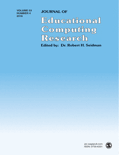
JOURNAL OF EDUCATIONAL COMPUTING RESEARCH
Scope & Guideline
Transforming education through technology.
Introduction
Aims and Scopes
- Educational Technology Integration:
The journal focuses on the integration of various educational technologies, such as artificial intelligence, virtual reality, and game-based learning, into instructional practices to enhance student engagement and learning outcomes. - Computational Thinking and Programming Education:
A significant emphasis is placed on research exploring computational thinking, programming education, and the development of related competencies among K-12 and higher education students. - Learning Analytics and Data-Driven Insights:
The use of learning analytics to gather, analyze, and interpret data related to student learning behaviors and outcomes is a core area of research, aiming to inform instructional design and intervention strategies. - Inclusive and Personalized Learning:
The journal promotes studies addressing inclusive education practices and personalized learning experiences, particularly for diverse learners, including those with special needs. - Game-Based and Experiential Learning:
Research on the effectiveness of game-based learning environments and experiential learning strategies is a consistent theme, highlighting their impact on motivation and academic achievement. - Artificial Intelligence in Education:
The journal explores the role of artificial intelligence in educational contexts, including AI-assisted learning systems and their implications for teaching and learning.
Trending and Emerging
- Artificial Intelligence and Machine Learning:
There is a significant increase in research exploring the applications of artificial intelligence and machine learning in educational contexts, particularly in personalized learning and adaptive systems. - Virtual and Augmented Reality:
Emerging studies on the use of virtual and augmented reality technologies in education are trending, highlighting their potential to create immersive learning experiences. - Game-Based Learning and Gamification:
The focus on game-based learning and gamification strategies is growing, with an emphasis on their effectiveness in enhancing student engagement and learning outcomes. - Social and Emotional Learning (SEL) Integration:
Research integrating social and emotional learning within technology-enhanced educational practices is gaining traction, recognizing the importance of emotional intelligence in learning. - Interdisciplinary Approaches to Learning:
There is a rising interest in interdisciplinary approaches that combine coding, computational thinking, and other academic disciplines, reflecting a holistic view of education. - Diversity and Inclusion in Learning Technologies:
The journal is increasingly focusing on studies that address diversity and inclusion through technology, emphasizing equitable access to educational resources and learning opportunities.
Declining or Waning
- Traditional Pedagogical Approaches:
Research centered around traditional pedagogical models, without the integration of technology, is becoming less frequent as the field increasingly emphasizes innovative and technology-enhanced learning strategies. - Basic Computer Literacy:
Studies focusing solely on basic computer literacy skills are diminishing as the journal shifts towards more complex themes such as computational thinking and digital fluency. - Passive Learning Environments:
There is a noticeable decline in research related to passive learning environments, such as lectures without interaction, as the emphasis moves towards active, student-centered learning approaches. - Standalone Technology Usage:
Research that examines the impact of technology used in isolation, without consideration for pedagogical integration or learning context, is becoming less prominent. - General Educational Research:
The journal is gradually moving away from broad educational research topics that do not specifically address the intersection of technology and learning, focusing instead on more specialized themes.
Similar Journals

MIER-Journal of Educational Studies Trends and Practices
Unlocking the potential of education through shared knowledge.MIER-Journal of Educational Studies Trends and Practices is a pivotal academic journal dedicated to advancing the field of education, focusing on innovative research and trends that influence teaching and learning practices. Published by the esteemed MODEL INST EDUCATION & RESEARCH, this journal offers a platform for researchers, educators, and students to disseminate knowledge and insights on various educational methodologies, curricular developments, and pedagogical theories. While the journal's current impact factor is not specified, its commitment to fostering scholarly discourse positions it as a notable contributor to the field. With an ISSN of 0976-8203 and an E-ISSN of 2319-1945, MIER aims to promote open access to current educational research, making it accessible to a global audience. By engaging with contemporary educational issues and emerging practices, this journal serves as a valuable resource for those dedicated to enhancing educational outcomes and developing effective teaching strategies.
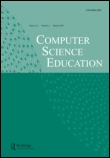
Computer Science Education
Connecting Theory and Practice in Computer Science EducationComputer Science Education is a prestigious journal published by ROUTLEDGE JOURNALS, TAYLOR & FRANCIS LTD, focusing on the critical intersection of computer science and educational practices. Established in 1988, this journal has become a cornerstone for researchers, educators, and practitioners interested in enhancing teaching methodologies and learning outcomes in computer science. With an impressive ranking within the top quartile (Q1) in both Computer Science (miscellaneous) and Education categories for 2023, as well as high Scopus percentile placements, it underscores its significance in advancing the discipline. The journal offers a platform for innovative research encompassing diverse educational environments and approaches, and while it currently does not offer open access options, it remains committed to disseminating high-quality scholarly work. As a vital resource for anyone looking to contribute to and understand the evolving landscape of computer science education, Computer Science Education continues to shape the future of learning in this dynamic field.
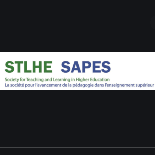
Canadian Journal for the Scholarship of Teaching and Learning
Innovating Teaching Practices for Tomorrow's LearnersThe Canadian Journal for the Scholarship of Teaching and Learning (CJSoTL) is a premier open-access journal dedicated to advancing research and discourse in the field of teaching and learning within higher education. Published by SOC TEACHING & LEARNING HIGHER EDUCATION, CJSoTL serves as a vital resource for educators, researchers, and students alike, promoting evidence-based practices and scholarship in higher education pedagogy. Since its inception in 2010, the journal has provided an inclusive platform for innovative research, case studies, and pedagogical strategies that enhance teaching effectiveness and student learning outcomes. Although specific metrics such as H-index and Scopus ranks are currently unlisted, the journal is committed to fostering a community of practice among scholars dedicated to improving teaching and learning environments. With its open-access policy, CJSoTL ensures that valuable knowledge is freely available, aligning with contemporary trends in academic dissemination and accessibility, thus making significant contributions to the scholarship of teaching and learning in Canada and beyond.

Informatics in Education
Fostering Collaborative Research for Enhanced Educational PracticesInformatics in Education is a premier academic journal published by Vilnius University, Institute of Mathematics and Informatics, focusing on the intersection of information technology and pedagogical innovation. With an ISSN of 1648-5831 and an E-ISSN of 2335-8971, this Open Access journal has been disseminating critical research since 2003, enabling widespread accessibility and collaboration across the global educational community. The journal's commitment to advancing the field is demonstrated by its impressive 2023 Category Quartiles: Q1 in Communication and Education and Q2 in Computer Science Applications, highlighting its significant impact on these disciplines. Located in Lithuania, Informatics in Education ranks impressively in Scopus, with a Social Sciences Communication rank of #54/511 (89th percentile) and a Social Sciences Education rank of #188/1543 (87th percentile). The journal's goals include fostering research that informs pedagogical practices and enhances educational outcomes through the innovative use of technology, ensuring it remains at the forefront of research in this vital field. Researchers, professionals, and students alike will find a wealth of knowledge within its pages to support their work and learning endeavors.
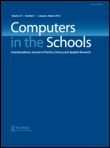
COMPUTERS IN THE SCHOOLS
Shaping the landscape of technology in schools.COMPUTERS IN THE SCHOOLS, published by ROUTLEDGE JOURNALS, TAYLOR & FRANCIS LTD, is a pivotal scholarly journal dedicated to exploring the intersection of technology and education. With an impressive publishing history dating back to 1984 and ongoing contributions until 2024, this journal provides a comprehensive platform for researchers and educators to disseminate innovative ideas and practices related to the use of computers in educational settings. Although the journal does not currently offer Open Access options, it maintains an esteemed position in the academic community, evidenced by its Q2 ranking across multiple categories including Computer Science, Education, and Library and Information Sciences in 2023. It is particularly valued for its rigorous peer-review process which ensures high-quality contributions. With its ISSN of 0738-0569, COMPUTERS IN THE SCHOOLS serves as an essential resource for advancing knowledge, fostering best practices, and influencing policy in the integration of technology into schools, making it indispensable for educators, researchers, and practitioners striving to enhance learning experiences through innovative technological approaches.

Educar
Connecting Thought Leaders in Education and CommunicationEducar, published by the Universitat Autònoma de Barcelona, stands as a significant contributor to the fields of education, communication, and human-computer interaction. With an Open Access policy since 1982, this journal provides an invaluable platform for the dissemination of innovative research and insightful perspectives from diverse academic backgrounds. The journal boasts a commendable position in the 2023 category quartiles, ranking Q2 in Communication and Q3 in both Education and Human-Computer Interaction, which underscores its relevance and influence within these disciplines. Educar is indexed in Scopus and reflects a strong reception in the academic community, with its Social Sciences - Communication category ranked 173rd out of 511 journals, affirming its 66th percentile standing. Researchers and professionals will find this journal particularly useful for accessing a wide range of studies that not only push the boundaries of knowledge but also offer practical insights that enhance educational practices and technological engagement.

Journal of Information Technology Education-Innovations in Practice
Advancing Pedagogy with Innovative InsightsThe Journal of Information Technology Education-Innovations in Practice (ISSN: 2165-3151; E-ISSN: 2165-316X), published by the Informing Science Institute, serves as a vital resource for researchers and practitioners in the intersection of information technology and education. With a focus on innovative practices and pedagogical advancements, this journal aims to disseminate high-quality research that enhances teaching methodologies and learning experiences in the digital age. Having demonstrated its relevance within the academic community, it proudly holds a Q3 category ranking in both Computer Science and Education fields as of 2023, alongside commendable Scopus rankings, namely #812 out of 1543 in Social Sciences Education and #92 out of 133 in Computer Science (miscellaneous). As a platform that actively promotes open access knowledge, the journal encourages boundary-pushing inquiries while catering to the evolving needs of educators and technology specialists alike. With its convergence period spanning from 2015 to 2024, the journal is poised to play a significant role in shaping the future of IT education.
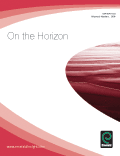
On the Horizon
Transforming educational practices with every publication.On the Horizon is an esteemed journal published by EMERALD GROUP PUBLISHING LTD, renowned for its commitment to advancing the field of education through innovative research and insightful discourse. With an ISSN of 1074-8121 and an e-ISSN of 2054-1708, this journal has been a significant contributor to educational scholarship since its inception in 2000, and it continues to be a vital resource for academics and practitioners alike as it converges towards 2024. Rated in the Q2 quartile for education in 2023, it ranks impressively at #318 out of 1543 in the Scopus database, placing it in the top 21% of journals in the field. On the Horizon provides a platform for cutting-edge research that explores emerging trends, challenges, and best practices within education, making it an indispensable tool for those dedicated to fostering learning and innovation. Although it does not currently offer open access, its rigorous peer-review process ensures that only the highest quality studies are shared with its audience. Researchers, professionals, and students will find valuable insights that can inform their work and contribute to the evolution of educational practices.
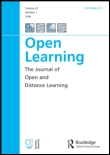
Open Learning
Transforming Learning Through Open DialogueOpen Learning, published by Routledge Journals, Taylor & Francis Ltd, is a leading peer-reviewed journal in the field of education and e-learning, showcasing innovative research and practice since its inception in 1970. With a robust impact factor and consistently ranked in the Q1 category for both education and e-learning by Scopus, this esteemed journal positions itself at the forefront of academic dialogue, exploring the evolving landscape of digital and open learning environments. The journal's authoritative content and empirical studies serve as essential resources for researchers, educators, and students striving to enhance pedagogical strategies and educational outcomes in a rapidly changing technological world. Published quarterly, Open Learning remains committed to cultivating scholarly exchange and advancing knowledge within the global education community.
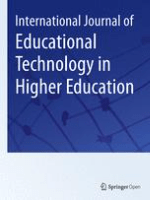
International Journal of Educational Technology in Higher Education
Leading the way in tech-enhanced learning.The International Journal of Educational Technology in Higher Education, published by Springer, stands as a pivotal platform for the dissemination of innovative research and findings in the field of educational technology. Since its inception in 2016, this open-access journal has been dedicated to enhancing the intersection of technology and education, providing scholars and practitioners with cutting-edge insights that shape contemporary educational practices. With a robust ISSN of 2365-9440, the journal has garnered impressive accolades, ranking in the top quartile (Q1) in both Computer Science Applications and Education disciplines as of 2023. Furthermore, it holds an esteemed position within the Scopus rankings, occupying rank #6 out of 1543 in Social Sciences Education, and #20 out of 817 in Computer Science Applications, highlighting its influential reach and scholarly impact. The journal especially focuses on how emerging technologies are transforming higher education, fostering a collaborative approach amongst researchers, educators, and professionals. By making its content openly accessible, it aims to bridge knowledge gaps and support the advancement of effective educational practices worldwide.